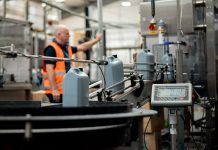A consortium of UK universities has been awarded £11.2 million to develop enzymatic recycling and help reduce plastic pollution, with a particular focus on low-energy and low-carbon solutions.
Steve Brownett-Gale, of pharmaceutical packagers, Origin, explains, “Research has led to a natural enzyme found in leaves being re-engineered to be able to completely break down polyethylene terephthalate (PET) plastics into their chemical components.
“These are the same chemical building blocks used to produce PET in the first instance.
“By improving the availability of recycled raw materials through its efficient process of breaking down PET plastics, further development into this discovery could enhance the circular economy of pharmaceutical packaging and address existing shortfalls in the supply of recycled raw materials.
“For example, designing-in a percentage of recycled materials into packaging is a popular solution to combatting plastic waste, but we could see greater availability of 100 percent recycled material packaging in the industry while avoiding generating demand for recycled plastic that means more virgin plastic is created to fill shortfalls in supply.
“If successful, the pharmaceutical packaging industry could sigh with a sense of relief because modern pharmaceutical packaging relies heavily on PET plastic, owing to its sterility, durability and being chemically inert.
“But universal concern over plastic waste bears down on the industry especially when questions about the sustainability of the plastic recycling process come to the fore.
“However, this won’t be a quick and cheap solution and it is reported that initially the cost of the recycled monomers will be roughly 60 percent more expensive than the virgin, petrochemical-derived, equivalents used to make PET plastic products.
“The good news is that over time the circular process will feed itself and feedstocks of the recycled monomers will grow, ultimately lowering costs for all stakeholders, including end-consumers.
“We are likely to see a continued and robust rise in the demand for recycled mono-material packaging materials, such as PETs, in the industry as this process is streamlined and becomes more widely used across the pharmaceutical packaging industry.”










